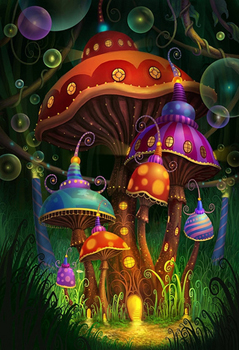Psychedelics have returned to the forefront of psychiatric research with the latest studies on the effects of psilocybin being reported on the front page of the New York Times. A negative stigma has been attached to anything surrounding the word "psychedelic," but this recent posting by the Times brings some mainstream legitimacy to this research and the overwhelming positive nature of the findings.
The report began with an experiment conducted by Johns Hopkins medical school, which studied the effects of psilocybin, the psychoactive agent in magic mushrooms, on cancer patients. One of the test subjects was Dr. Clark Martin who had been suffering from depression throughout his struggle with chemotherapy for kidney cancer. He claims that the 6-hour trip was a metamorphosis that immediately helped him overcome his depression and has evolved his whole outlook on life, for the better.
The research didn't stop with the terminally ill. Due to the intriguing neurological similarities between hallucinogenic experiences and the mystical revelations produced through meditation, scientists like Roland Griffiths of Johns Hopkins, have looked to study the hallucinogenic effects on people who have no known serious physical or emotional problems. One of the studies conducted by Griffith involved 36 people who did not have any prior experience with hallucinogens, and to make it a "double-blind" experiment, they measured effects on groups given either a placebo, psilocybin, or another drug like Ritalin, nicotine or caffeine. The monitors of the experiment were not told who was given what so that they wouldn't be biased by the reactions. Two follow-up surveys were given at two and 14 months after the study, which reported that those given psilocybin expressed "improvements in their general feelings and behavior," and "satisfaction with their lives and rated the experience as one of the five most meaningful events of their lives."
Interviews with subjects like Dr. Martin and others described Bodhisattva-like qualities of the experience with their "egos and bodies vanishing as they felt part of some larger state of consciousness in which their personal worries and insecurities vanished," and experienced it as a "whole personality shift."
Since the subjects' reports mirrored closely to that of those reported with religious and shamanistic experiences, Dr. Griffiths said that "it seems likely the human brain is wired to undergo these 'unitive' experiences, perhaps because of some evolutionary advantage."
A related study headed by Dr. Charles S. Grob of U.C.L.A has been researching the effects of psilocybin on the terminally ill, and how this "existential medicine" helps "dying people overcome fear, panic, and depression." According to Grob, "Under the influences of hallucinogens, individuals transcend their primary identification with their bodies and experience ego-free states before the time of their actual physical demise, and return with a new perspective and profound acceptance of the life constant: change."
With the reemergence of studies like those of Dr. Griffith and Dr. Grob, and with unbiased, mainstream reports such as this article in the NY Times, we will hopefully see a reevaluation, and change, of the use and classification of Schedule 1 drugs.
Image: "Magic Mushrooms" by vaXzine on Flickr courtesy of
Creative Commons Licensing.















